#kate douglas wiggin
Text


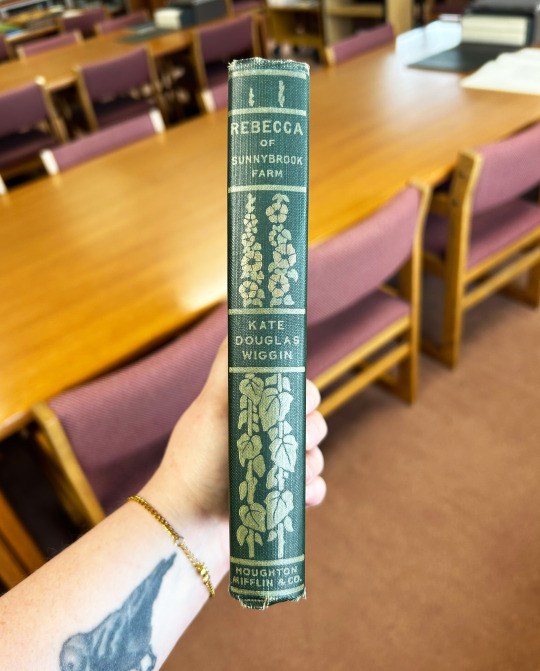
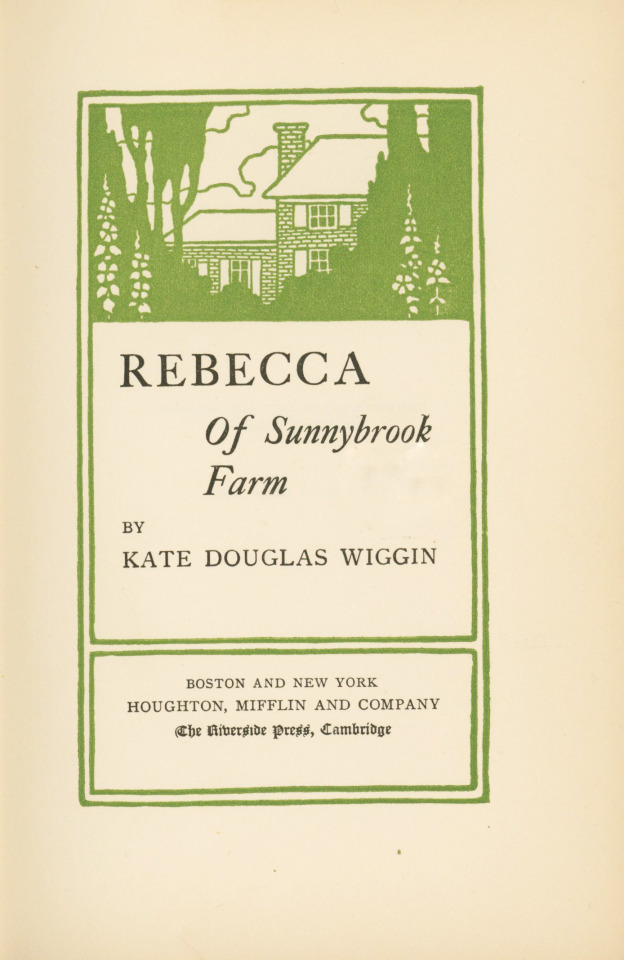
Publishers' Binding Thursday
This week's publishers' binding example is a classic for young girls—Rebecca of Sunnybrook Farm by American educator, author, and composer Kate Douglas Wiggin. Published in 1903 by Houghton Mifflin & Co, Rebecca of Sunnybrook Farm was an instant bestseller and was adapted for both stage and screen, with a 1938 film adaptation starring Shirley Temple.
I believe this is a first edition of the book but a fourth printing, judging by several lines in the book that were changed between the first printing and this one. The cover features a vignette of a brick house with green shutters surrounded by trees and flowers with another image of a lovely little stream flowing through a meadow below. The spine features flowering vines climbing up it, along with the title, author, and publisher. The title page has the same illustration of a house that is on the front cover, but printed in a nice spring green.
View more Publishers' Binding Thursday posts.
-- Alice, Special Collections Department Manager
#Publishers' Binding Thursday#Rebecca of Sunnybrook Farm#Kate Douglas Wiggin#Houghton Mifflin & Co#Shirley Temple#publishers' bindings#Alice
19 notes
·
View notes
Text
Summer Magic (1963)
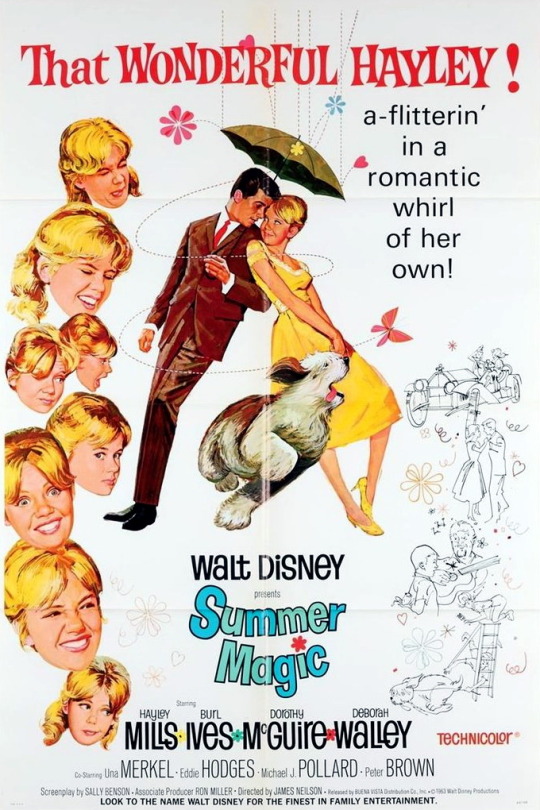
Mother Carey’s Chickens by Kate Douglas Wiggin (1911)

#Disney#Movie#Disney movie#Summer magic#1963#Burl Ives#Haley Mills#Mother Carey's chickens#Book#Kate Douglas Wiggins#1911#Wholesome#Musical
2 notes
·
View notes
Text
Manga, books and authors mentioned in A Drunken Dream and Other Stories
I wrote the english names that were used in the book. Honestly the way I organized this gave me a headache but I hope it's useful <3 See more for the list of authors that were mentioned briefly.
Manga mentioned in the interview
Mama’s Violin - Tetsuya Chiba
Tomboy Angel - Mitsuteru Yokoyama
Shinsengumi; Astro Boy - Osamu Tezuka
Harp of the Stars; Hello, Teacher; The White Troika - Hideko Mizuno
Mist, Roses and Stars - Shotaro Ishitani
The Boy from Dartmoor - Nanae Sasaya
In the Sunroom; The Song of the Wind and the Trees - Keiko Takemiya
You Can Hear the Rain; Birth - Yumiko Oshima
Norakuro - Suiho Tagawa
The Rose of Versailles - Riyoko Ikeda
Mentioned in Rachel Thorn's essay
Fuichin-san - Toshiko Ueda
Tomorrow’s Joe - Tetsuya Chiba
Eyes of Ice - Nanae Sasaya
Aim for the Ace! - Sumika Yamamoto
Toward the Terra; Fly Me to the Moon! - Keiko Takemiya
Banana Bread Pudding; F-Shiki Ranmaru - Yumiko Oshima
Two in a White Room; Arabesque; The Son of Heaven in the Land of the Rising Sun; Terpsichore - Ryoko Yamagishi
Mari and Shingo; A Staff and Wings - Toshie Kihara
Books
The Secret Garden - Frances Hodgson Burnett
Anne of Green Gables - Lucy Maud Montgomery
Rebecca of Sunnybrook Farm - Kate Douglas Wiggin
Little Women - Louisa May Alcott
Shank’s Mare - Ikku Jippensha
The Currents of Space - Isaac Asimov
The Generative Enterprise Revisited - Noam Chomsky
Phantoms in the Brain - V.S. Ramachandran
There's notes at the end giving more context for these authors but I don't have it in me rn.
Interview: Miyako Maki
Masako Watanabe
Kazuo Umezu
Sanpei Shirato
Mineko Yamada
Ryoko Yamagishi
Jun Morita
Yasuko Sakata
Akiko Hatsu
Shio Satoh
Aiko Itoh
Machiko Satonaka
Essay: Yoshiko Nishitani
Minori Kimura
Mineko Yamada
Akira Mochizuki
Sato Tomoe
Book authors: Kenji Miyazawa
Jean Stratton-Porter
Robert Heinlein
Ryotaro Shiba
Sawako Ariyoshi
Herman Hesse
Ray Bradbury
Jean Cocteau
Kenichiro Mogi
#moto hagio#rachel thorn#a drunken dream and other stories#year 24 group#retro shoujo#I apologize for any mistake
13 notes
·
View notes
Text
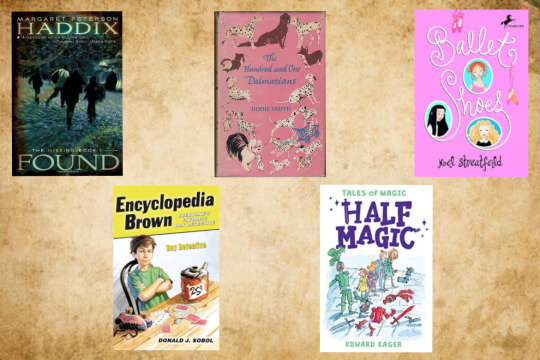
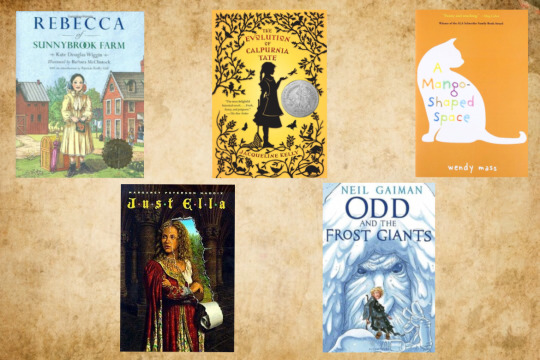
#best childhood book#poll#the missing#encyclopedia brown#the hundred and one dalmatians#tales of magic#ballet shoes#rebecca of sunnybrook farm#just ella#the evolution of calpurnia tate#odd and the frost giants#a mango shaped space
44 notes
·
View notes
Text
I have neither the time nor the inclination to reread every single one of these this Christmas season, but I'd like to get to some of them and wanted a reference. These are nonexhaustive lists of books from my own collection.
Christmas as a primary theme/setting
While Shepherds Watch by E. L. Bates
I Am Half Sick of Shadows and Thrice the Brinded Cat Hath Mewed by Alan Bradley
The Snow Sister by Emma Carroll
"The Flying Stars" by G. K. Chesterton
A Christmas Carol by Charles Dickens
"The Adventure of the Blue Carbuncle" by Arthur Conan Doyle
The Sister of the Angels by Elizabeth Goudge
Addy's Surprise by Connie Porter
"The Necklace of Pearls" by Dorothy L. Sayers
Samantha's Surprise by Maxine Rose Schur
Kirsten's Surprise by Janet Beeler Shaw
Noel Streatfeild's Christmas Stories by Noel Streatfeild
Felicity's Surprise, Josefina's Surprise, Kit's Surprise, and Molly's Surprise by Valerie Tripp
The Birds' Christmas Carol by Kate Douglas Wiggin
"Jeeves and the Yule-Tide Spirit" by P. G. Wodehouse
Not about Christmas primarily but have memorable sequences set then
Little Women by Louisa May Alcott
Ramona and Her Father by Beverly Cleary
Hans Brinker by Mary Mapes Dodge
The Lion, the Witch and the Wardrobe by C. S. Lewis
Tenthragon by Constance Savery
Most of the Shoes books but especially Theater Shoes/Curtain Up by Noel Streatfeild
Nevermoor: The Trials of Morrigan Crow by Jessica Townsend
Most of the Little House books but especially Little House in the Big Woods, Little House on the Prairie, and By the Shores of Silver Lake by Laura Ingalls Wilder
#random personal stuff#this one is up for grabs#I can reel it back in if it gets out of hand no worries#the AG Christmas stories are classics and I stand by this
51 notes
·
View notes
Photo

You knew some books are for the birds, but here's one that's dedicated to hens, ducks, and geese. From The Diary of a Goose Girl by Kate Douglas Wiggin, 1902.
9 notes
·
View notes
Text
2 notes
·
View notes
Text

Hay una especie de magia cuando nos vamos lejos y, al volver, hemos cambiado. -Kate Douglas Wiggin-

18 notes
·
View notes
Text
This is the tentative “active” tbr for the year. I’m sure much will happen to upset it.
Ordinary Monsters by J M Miro
Tomorrow and Tomorrow and Tomorrow by Gabrielle Zevin DNF
Outlander by Diana Gabaldon
City of Last Chances by Adrian Tchaikovsky DNF
All Systems Red by Martha Wells
Aquanaut by Rick Stanton
Everyone in My Family Has Killed Someone by Benjamin Stevenson DNF
Book of Night by Holly Black
The Stolen Heir by Holly Black
Maresi Red Mantle by Maria Turtschaninoff
The Amazing Maurice and His Educated Rodents by Terry Pratchett
Bramble Fox by Kathrin Tordasi DNF
The Inheritance of Orquidea Divina by Zoraida Cordova
The Fellowship of the Ring by J R R Tolkien
The Thursday Murder Club by Richard Osman
Howl’s Moving Castle, Castle in the Air and the House of Many Ways by Diana Wynne Jones
A Forgery of Roses by Jessica S Olson
Witch Hat Atelier by Kamome Shirahama
Ninth House by Leigh Bardugo DNF
The Goblin Emperor by Kathrine Addison
A Conspiracy of Kings by Megan Whalen Turner
Persuasion by Jane Austen
How to Survive Your Murder by Danielle Valentine DNF
House of Hollow by Krystal Sutherland
Project Hail Mary by Andy Weir
Hearts of Gold by Jackie French
Platypus Matters by Jack Ashby
The Painted Veil by W Somerset Maugham
A House of Pomegranates and The Picture of Dorian Grey by Oscar Wilde
Mother Carey’s Chickens by Kate Douglas Wiggin
Caraval by Stephanie Garber
Jonathan Strange & Mr Norrell by Susanna Clarke
A Dragon of a Different Color, and Last Dragon Standing by Rachel Aaron
#I anticipate that several of them will be dnf’s the only question being how many#this will be interesting because I don't normally track my dnf's as stringently as I do with books I finish#technically there are others from my library and project gutenberg that I could add but whatever#I'd be wildly happy if I manage to get through most of these#reading#reading list#books#Fizzy talks#last year kind of felt lackluster on the reading front so I'm hoping to do something about that#to that effect we're taking up a stricter dnf policy compared to last year and going for titles we're more certian will spark some joy
8 notes
·
View notes
Photo

"A place in which it is easy to be good." From The Diary of a Goose Girl by Kate Douglas Wiggin, 1902.
1 note
·
View note
Text



Laura Coombs Hills (1859–1952) was an American artist and illustrator who specialized in watercolor and pastel still life paintings, especially of flowers, and miniature portrait paintings on ivory. She became the first miniature painter elected to the Society of American Artists, and she was a founder of the American Society of Miniature Painters. She also worked as a designer and illustrated children's books for authors such as Kate Douglas Wiggin and Anna M. Pratt. via Wikipedia
Born September 7, 1859
Newburyport
Died: February 21, 1952 (aged 92)
2. Laura Coombs Hills, Portrait of Mrs. T., miniature painted on ivory ca. 1899.
3. Laura Coombs Hills, image from 1897 Dream Roses calendar
0 notes
Text
1 – ‘Hiçbir şey zekayı seyahat etmek kadar geliştirmez.’
Emile Zola
2 – ‘Seyahat için yaptığın yatırım kendin için yaptığın en iyi yatırımdır.’
Matthew Karsten
3– ‘Uzaklara gittikten sonra tamamen değişmiş biri olarak dönmek gerçek bir mucize.’
Kate Douglas Wiggin
4 – ‘Gezgin bir yere varmak için değil, keşfetmek için seyahat eder.’
Goethe
5 – ‘Hayat bir kitaptır ve gezip görmeyenler hep aynı sayfayı okur.’
St. Agustine
6 – ‘Gezgin önüne ne çıkarsa onu görür, ama turist neyi görmek istiyorsa onu.’
G.K. Chesterton
7 – ‘Senede bir defa daha önce hiç görmediğin bir yere git.’
Dalai Lama
8 – ‘Her şey kötüye gittiğinde kendine bir tatil ısmarla.’
Betty Williams
9– ‘Kıyıyı gözden kaybetmeye cesaret etmedikçe insan, yeni okyanuslar keşfedemez.’
Andre Gide
10 – ‘Turistler nereye gittiklerini, gezginler nereye gideceklerini bilemezler.’
Paul Theroux
11– ‘Seyahatin önündeki tek engel kapının eşiğidir.’
Bosna Atasözü
12 – ‘Para harcayarak sizi zengin yapacak tek şey seyahat etmektir.’
Anonim
13 – ‘Ne kadar uzağa gidersem kendime o kadar çok yakınlaşıyorum.’
Andrew McCarthy
14 – ‘Yaşa, seyahat et, maceraya atıl, şükret ve asla pişman olma.’
Jack Kerouac
15 – ‘En uzun yolculuklar bile tek bir adımla başlar.’
Laozi
16– ‘Bilmediğin bir yola gitmek bilmediğin bir yönünü keşfetmektir.’
Martin Buber
17- ‘Seyahat insanı alçak gönüllü yapar. Size dünyada ne kadar küçük bir yer işgal ettiğinizi görmenizi sağlar.’
Gustave Flaubert

1 note
·
View note
Text
I miei film live action vintage Disney preferiti tratti da romanzi
Odio appassionatamente i moderni film live action Disney, rifacimenti di cartoni animati classici che ho amato, ma amavo i vecchi live action Disney degli anni '60 e '70, tratti da famosi romanzi per ragazzi, ecco la lista dei miei preferiti.
4 bassotti per un danese, tratto dal libro The Ugly Dachshund di Gladys Bronwyn Stern
Link: https://amzn.to/4c1t3Mo
Trama: Fran (Frances) e Mark Garrison sono una giovane coppia, felice e recentemente sposata, che possiede una bassotta, la pupilla di Fran. La cagnetta aspetta i cuccioli e quando i due la portano dal veterinario, il dottor Pruitt, per partorire, quest'ultimo mostra a Mark un cucciolo di danese che la madre, non avendo abbastanza latte, ha messo da parte. Il veterinario propone quindi a Mark di prendere con se il cucciolo almeno per il periodo dello svezzamento. Nonostante le iniziali perplessitagrave; Mark si fa intenerire dal cucciolone e decide di portarlo a casa…
FBI operazione gatto, tratto dal libro Undercover Cat scritto dalla coppia di autori di romanzi polizieschi nota come "I Gordon" (composta da Gordon Gordon e Mildred Nixon Gordon)
Link: https://amzn.to/3RxAral
Trama: Nel corso di una rapina, una cassiera (Grayson Hall) viene rapita. Un gatto siamese, che casualmente transita dal covo dei rapitori, diviene involontariamente il portatore di un messaggio d'aiuto che viene colto prontamente dalla sua padrona.
L'isola sul tetto del mondo, tratto ratto dal romanzo di Ian Cameron (alias Donald Gordon Payne) Il cimitero dei capodogli
Link: https://amzn.to/4bakgX8
Trama: Il benestante londinese sir Anthony Ross, dopo aver ricevuto la notizia che il figlio Donald è scomparso nel corso di un viaggio esplorativo nella parte settentrionale della Groenlandia, decide di organizzare una spedizione per ritrovarlo a tutti i costi. A seguirlo nelle ricerche il prof. Ivarsson, esperto in geologia e in culture primitive, e il cap. Brieux, inventore e costruttore di un singolare dirigibile, l'Hyperion. Da Londra, nel 1907, gli esploratori si trasferiscono velocemente a bordo del dirigibile del cap. Brieux per partire alla volta di Port Conger, un'estrema stazione esquimese nella zona dell'Artide. Preso a bordo Oomiak, un indigeno reduce dalla spedizione del disperso Donald, dopo una tempesta e un atterraggio di fortuna, il gruppo di sir Anthony raggiunge un'amenissima terra circondata da ghiacci mai vista prima e mai segnalata in nessuna delle cartine esistenti. Il clima di quella terra è piuttosto mite a causa di fenomeni vulcanici e gli individui abitanti l'isola sono discendenti dei vichinghi…
PISTA! ARRIVA IL GATTO DELLE NEVI, tratto dal libro Chateau Bon Vivant di Frankie e John O'Rear.
Link: https://www.vecchio-cinema.it/pista_arriva_il_gatto_delle_nevi_dvd_1972_dean_jones_67.html
Trama: John Silvester Baxter, newyorkese, impiegato intristito dalla monotonia del lavoro, eredita da uno zio dimenticato l'Imperial Hotel, a Silver Hill nel Colorado. La fallace notizia che l'albergo offra molti guadagni, lo induce a trasferirvisi con la moglie Suzy, i figli Richard e Christine, il cane Cuor di Leone. Ma torva un albergo fatiscente che, come lo informano sul posto, ebbe momenti di fortuna soltanto tempo fa. Caparbio, Baxter trasforma l'albergo ed i numerosi terreni annessi in una stazione sciistica. Ottiene qualche concreta soddisfazione quando un treno di sportivi rimane lì bloccato per due settimane, ma poi l'inadeguatezza dell'albergo e l'abbondante sprovvedutezza della volonterosa famiglia e del personale assunto provocano la catastrofe finanziaria. John cerca di rimediare al fallimento prendendo parte a una gara che offre molto denaro al vincitore con risultati esilaranti.
Magia d'estate, tratto dal libro Mother Carey’s Chickens dell’autrice Kate Douglas Wiggin
Link: https://amzn.to/3VHWzB7
Trama: Ambientato circa nel 1899 a Boston. Dopo la morte di suo marito la signora Carey e i suoi quattro figli, due femmine e due maschi faticano a tirare avanti solo con la pensione del defunto, devono trasferirsi in una casa più economica, e la figlia maggiore Nancy, molto intraprendente riesce a scovare una bella casa in campagna dove potrebbero stare gratis facendo dei lavoretti di manutenzione. Non sanno che chi gliela offre lo fa senza il benestare del proprietario Tom Hamilton, assente ormai da anni. La famiglia si trasferisce e gioisce dell’atmosfera campestre, le due figlie si innamorano entrambe del giovane maestro locale ma solo una potrà conquistarlo e starà nella saggezza della madre consolare la delusa, Nancy, che presto troverà però un nuovo pretendente proprio in Tom Hamilton che era giunto in paese proprio per cacciare la famiglia dalla casa che voleva vendere.
Il fantasma del pirata barbanera, tratto dal romanzo omonimo di Ben Stahl
Link: https://amzn.to/3XymkW5
Trama: Un giovane insegnante di educazione fisica si trasferisce a Godolphin per allenare la squadra di atletica della cittadina. Prende alloggio in una locanda posta su un isolotto gestito da vecchie zitelle discendenti del pirata Teach detto Barbanera. Finisce cosigrave; coinvolto nei maneggi delle vecchine per preservare la casa del loro avo dalle mire di un pericoloso gangster intenzionato a trasformarla in casa da gioco. Addirittura il giovane riesce a evocare il fantasma del vecchio bucaniere che interviene in soccorso delle sue discendenti.
Pomi d'ottone e manici di scopa, tratto dal romanzo omonimo di Mary Norton
Link: https://amzn.to/3Vs1yES
Trama: Per Carey, Charles e Paul si prospetta un'estate ben noiosa, mandati a stare da una vecchia zia che non sorride molto, con una domestica anziana e severa in una casa enorme, dal giardino senza fiori. Ecco perché i giorni passano lentissimi, tutti uguali l'uno all'altro! Ma il giorno in cui Miss Price cade dalla scopa, per i tre ragazzi comincia la più incredibile delle avventure. La loro vicina di casa, infatti, è nientemeno che un'apprendista strega, anche se i suoi incantesimi non sempre funzionano come vorrebbe. Tra la matura signorina e i piccoli vicini si stabilisce subito una grande amicizia, e sarà grazie al pomo di ottone di un letto, stregato da Miss Price, che i quattro faranno i più straordinari viaggi nel tempo e nello spazio. E chissà che, viaggiando viaggiando, l'incerta e titubante strega non finisca per trovare nientemeno che l'amore..
1 note
·
View note
Text

The young king of the Black Isles: "When he came to this part of his narrative, the young king could not restrain his tears."
Maxfield Parrish, 1906
Originally painted as a frontispiece for Collier’s Arabian Nights VIII from 18 May 1907. Also the illustration on page 74 in The Arabian Nights, Their Best-Known Tales (1909) edited by Kate Douglas Wiggin and Nora A. Smith.
0 notes
Text
audiobook : The Diary of a Goose Girl By: Kate Douglas Wiggin (1856-1923)
0 notes
Text
I'm rereading Mother Carey's Chickens, a 1911 children's book by Kate Douglas Wiggin, mostly because there's a subplot in it which I think might be relevant to my search for portrayals of CEN in children's literature of this era (...and guess what subplot got axed in Summer Magic, a loosely adaptated 1963 film version--but that's another issue). Anyway, this time I found myself unexpectedly sympathetic toward a character Wiggin does not want the audience to be very sympathetic toward.
(and wow, this got longer than I expected and is A Rant, sorry!)
Basically, the book is about the Carey family--a widow and her four children--who have suffered a significant finanical decline after the father's death and have to move into a new house in a small town and make a lot of sacrifices and adjustments, while having various slice-of-life adventures. Not long after the move, their cousin Julia comes to live with them.
And Wiggin really hammers it into the reader's head that Julia is annoying. She's "the pink of perfection" (a phrase memorably used in a song in the 1963 film), she knows it, and she never lets anyone forget it. (Think a female version of my OC Josiah, and you're probably not far off.) She won't shut up about the rich family she used to live with, and she can't be bothered to join the others in anything so demeaning as chores. She's so dull and imaginative that "she bored her own mother terribly." She has no sense of humor, she's no fun, she's tidy and clothes-conscious, she gets perfect grades in school--in short, she's the worst and nobody likes her. Even Mrs. Carey admits "frankly" that she doesn't like Julia.
And the other children are understandably frustrated with her and very vocal about this among themselves. There's friction between her and the Careys--and the Careys don't always come off looking very good either, although the narrative doesn't recognize it. The two oldest children (who are about fifteen and fourteen, I think) even go so far as to write a poem mocking Julia's appetite (and, by implication, her weight) and tacking it up in her room. Julia in tears shows it her aunt, who finds it funny and has to struggle to show the proper sympathy. Julia protests that the family she used to live with never mentioned her appetite and instead encouraged her to eat. Mrs. Carey concedes that her older children can get carried away with joking and forgot Julia wasn't used to it.
And then she adds, "And don't forget, my dear, that in a large family like ours we must learn to 'live and let live.'" So clearly it's Julia's fault for being so oversensitive about just a joke, right? Because nobody likes her, and she had it coming. She needs to learn to have a sense of humor!
Eventually, Kathleen, the younger Carey daughter, in a moment of provocation lets it slip that Julia's father is the reason the family has so little money (long story). An angry Julia tells her aunt. Kathleen feels horrible about it and apologizes profusely, but Julia is not immediately forgiving and points out what a victim she is here--as a fatherless girl and a guest in their home.
And then Mrs. Carey gives her A Speech (emphasis mine):
"You are wrong there, Julia. I fail to see why you should not take your full share of our misfortunes, and suffer as much as we, from our too small income. It is not our fault, it is not yours. You are not a privileged guest, you are one of the family. If you are fatherless just now, my children are fatherless forever; yet you have not made one single burden lighter by joining our forces. You have been an outsider, instead of putting yourself loyally into the breach, and working with us heart to heart. I welcomed you with open arms and you have made my life harder, much harder, than it was before your coming. To protect you I have had to discipline my own children continually, and all the time you were putting their tempers to quite unnecessary tests! I am not extenuating Kathleen, but I merely say you have no right to behave as you do. You are thirteen years old, quite old enough to make up your mind whether you wish to be loved by anybody or not; at present you are not!"
Does Julia deserve to be informed that she has been standoffish and unhelpful and whiny and needs to be a team player? Absolutely. Blaming her for the Carey children's behavior though? Not so much. And to tell anyone--especially someone so young--that whether she is loved is solely up to her and currently no one loves her--is incredibly harsh and uncalled for.
The narrative consistently presents Mrs. Carey as The Ideal Mother, so there is no recognition of the hurtfulness of such a comment. Instead, it's that comment in particular that is presented as what finally prompts Julia's character development.
Not to be loved, if that really were to be her lot, rather terrified Julia. She secretly envied Nancy [Carey]'s unconscious gift of drawing people to her instantly; men, women, children,—dogs and horses, for that matter. She never noticed that Nancy's heart ran out to meet everybody, and that she was overflowing with vitality and joy and sympathy; on the contrary, she considered the tribute of affection paid to Nancy as a part of Nancy's luck. Virtuous, conscientious, intelligent, and well-dressed as she felt herself to be, she emphatically did not wish to be disliked, and it was a complete surprise to her that she had not been a successful Carey chicken.
At this point, I am feeling sorry for this child, obnoxious though she can be. This girl has a father who isn't in her life much and a mother who was flighty and bored with her and either died or left the picture when her daughter was five so she was raised by a governess and has been trying really hard to be everything her mother wasn't--well-behaved and responsible. And now after living with an apparently kind and accepting family, she's been transplanted to an unfamiliar environment with cousins who complain about and mock her. No one is listening to her; no one is bothering to help her. She talks about her friend's family so much because that's all she knows. As annoying as her displays of perfection are, it's her flawed attempt to seek love and validation. She feels inadequate compared to her outgoing and universally adored cousin Nancy (who co-wrote the mean poem and has been the most vocally critical of her--guess her heart doesn't run out to meet just everybody!), and the narrative faults her for lacking the right sort of personality. Apparently the only acceptable way for her to earn love is to make an effort to be more like Nancy. And Julia desperately wants to be loved.
But there are people who love her unconditionally! She points out that her friend, the daughter of the family she used to live with, always loved her. Mrs. Carey replies, "Then either Gladys has a remarkable gift of loving, or else you are a different Julia in her company [...]"
Ouch.
She then proceeds to accuse Julia of committing "the sin of causing your brother to stumble" by provoking her cousins' annoyance. Kathleen, though, doesn't agree and apologizes again. And Julia takes pity on her, shows some affection, and they make up.
From here, Julia is on the road to character development, and Mrs. Carey gets all the credit for it. And sure, Julia has learned that she needs to be more helpful and less critical, but she has also learned that love is earned and that her family will only accept her if she toes a certain line. Is this really any different from her previous efforts of performing perfection?
And anyway, it bothers me that the narrative is so merciless to her. Yes, she's got major issues that she needs to grow past. But is being a girl exhibiting the results of a problematic upbringing enough cause for the level of vitriol that she is given? Couldn't there have been a more effective way to prompt her character development than for a family member whom she respects to tell her she's unlovable? Wiggin's narrative extends compassion to the flaws of characters like Nancy but withholds it from others (not just Julia). Why? Why are some people more deserving of understanding? Because they're the main character?
And that's never really struck me before, I've always read this book at face value, but somehow today I ended up with emotions about Julia Carey. Who knew. If you've got this far, thank you for coming to my Rant.
13 notes
·
View notes